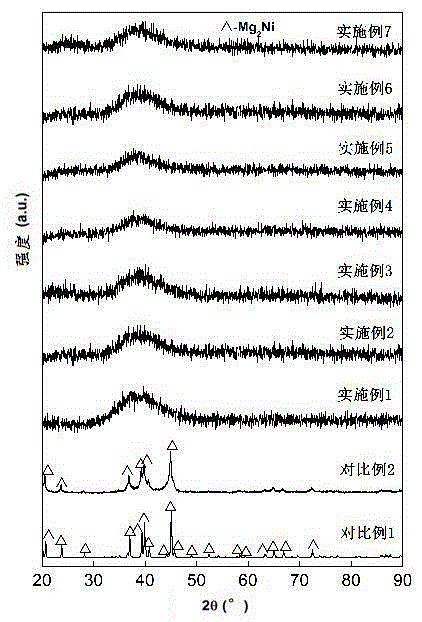Nanocrystalline-amorphous high-capacity hydrogen storage electrode alloy and preparation method thereof
An electrode alloy and high-capacity technology, applied in the field of hydrogen storage alloy materials, can solve the problems of poor cycle stability of Ni-type hydrogen storage alloys, long-term preparation of amorphous, and difficulty in mass production, etc., to achieve electrochemical hydrogen storage at room temperature The effect of improved capacity, reduced thermal stability, and good low-temperature hydrogen absorption and desorption performance
- Summary
- Abstract
- Description
- Claims
- Application Information
AI Technical Summary
Problems solved by technology
Method used
Image
Examples
Embodiment 1
[0030] According to the chemical formula (Mg 23.5 Zr 0.5 Ni 10 Co 2 ) 0.9 Nd 0.1 , select bulk metal magnesium, metal zirconium, metal nickel, metal cobalt and metal neodymium as raw materials, all metal purity ≥99.5%. The crucible capacity of the melting furnace is about 2kg, and the ingredients are calculated as 2kg per furnace. Weigh 922.4g of magnesium metal, 68.2g of metal zirconium, 877.6g of metal nickel, 176.2g of metal cobalt and 25.2g of metal neodymium according to the chemical dose ratio, put them in a magnesia crucible of an intermediate frequency induction furnace, then cover the furnace cover and vacuumize About 40min to vacuum 5×10 -3 Above Pa, then fill with helium until the gas pressure reaches 0.04MPa, adjust the power to 4.5kW, control the temperature at 650°C to melt the metal magnesium, then adjust the power to 25kW, and control the temperature at 1600°C to melt other metals. After all the metals are melted, keep under the melting conditions for 5 ...
Embodiment 2
[0033] The composition of the alloy is: (Mg 23.5 Zr 0.5 Ni 10 Co 2) 0.8 Nd 0.2 ; Weigh 908.8g of magnesium metal, 67.2g of metal zirconium, 864.6g of metal nickel, 173.6g of metal cobalt and 55.8g of metal neodymium according to the chemical dose ratio, and prepare the alloy according to the method of Example 1, the difference is that the quenching speed used is 10m / s. XRD test results show that the alloy has a nanocrystalline-amorphous structure. The results are shown in figure 1 The electrochemical capacity and cycle stability of the alloy were tested with a program-controlled simulated battery tester. The results are shown in Table 1.
Embodiment 3
[0035] The composition of the alloy is (Mg 23.5 Zr 0.5 Ni 10 Co 2 ) 0.95 Nd 0.05 ; Weigh metal magnesium 1008.7g, metal zirconium 74.6g, metal nickel 959.7g, metal cobalt 192.7g, metal neodymium 13.0g according to the chemical dose ratio, prepare the alloy according to the method of Example 1, and the XRD test result shows that the alloy has nanocrystalline-non-crystalline crystal structure, see figure 1 The electrochemical capacity and cycle stability of the alloy were tested with a program-controlled simulated battery tester. The results are shown in Table 1.
PUM
| Property | Measurement | Unit |
|---|---|---|
| diameter | aaaaa | aaaaa |
| diameter | aaaaa | aaaaa |
Abstract
Description
Claims
Application Information
 Login to View More
Login to View More - R&D
- Intellectual Property
- Life Sciences
- Materials
- Tech Scout
- Unparalleled Data Quality
- Higher Quality Content
- 60% Fewer Hallucinations
Browse by: Latest US Patents, China's latest patents, Technical Efficacy Thesaurus, Application Domain, Technology Topic, Popular Technical Reports.
© 2025 PatSnap. All rights reserved.Legal|Privacy policy|Modern Slavery Act Transparency Statement|Sitemap|About US| Contact US: help@patsnap.com

